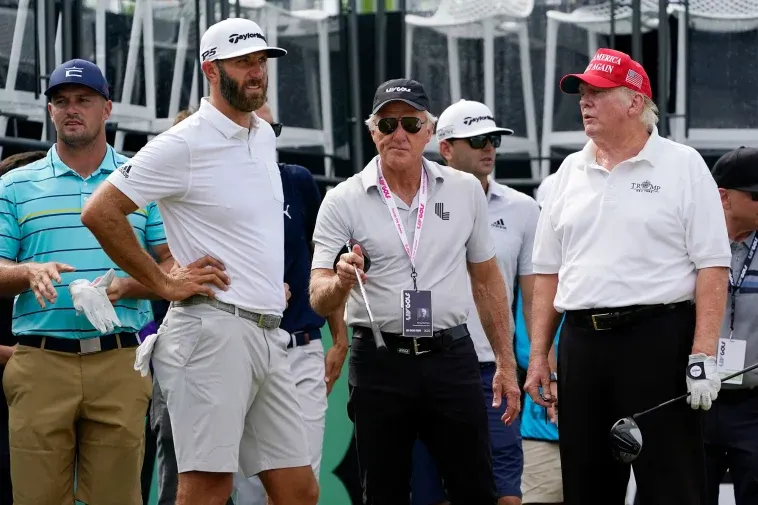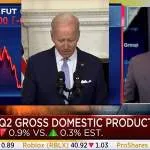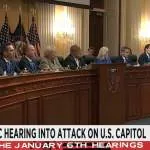(New York Post) Greg Norman sat poolside on Wednesday at Trump Bedminster ahead of LIV Golf’s third event since its recent inception.
The 67-year-old Aussie, a two-time major championship winner whose length of reign as the No. 1 ranked player in the world was only outdone by Tiger Woods, looked relaxed, satisfied and bubbling with anticipation for the week as he spoke exclusively to The Post about an array of topics related to the controversial Saudi-backed tour.
Norman, the face of LIV Golf as its CEO and commissioner, held no punches back as he spoke about LIV Golf’s place in the ecosystem of the sport, the pushback by the PGA Tour, his personal battle with the PGA Tour that dates back to the ’90s, the marquee players LIV has signed and his own legacy in the sport. He, too, pushed back at those critical of him and the players taking the Saudi money.
Q: How do you feel about how quickly LIV Golf has come about and the current momentum the tour has generated?
A: One word: Product. We knew how good the product was, because of the business model. It was about getting the product to show itself. In six rounds of golf (the first two events, in London and Portland, Ore.), look at what we’ve done to change the perception of what LIV was all about. The players and the fans have spoken and we couldn’t be happier. Each week, we build the product better and better and better. That’s our goal. Our runway is a really long one to keep building, because every week is different.

Q: What is your anticipation about the energy level this week playing in the New York market?
A: Look, this was a market we were going to focus on immediately, because the PGA Tour wasn’t focused on it. They’re not playing in New York, New Jersey, Boston, Chicago, which is insane. So, we wanted to make sure that we brought our product to this market, and New York City is obviously the home of the CEOs and the institutional money. So, it was logical that we get here sooner than later.
Q: What do you think the atmosphere at Trump Bedminster will be like?
A: Going into Portland (the second event) I was nervous because of all the white noise, and it just turned out to be white noise. Coming here it’s a little bit different because it’s President Trump’s property. I was more nervous for Portland than London (the first event) just because of the sentiment from the senator (Oregon Senator Ron Wyden) and how he was going against us — for all wrong reasons.
(Editor’s note: Last month, Wyden accused the Saudi government of sports washing, telling the Associated Press, “It’s just a page out of the autocrats’ playbook covering up injustices by misusing athletics in hopes of normalizing their abuses.”)

Q: Are you surprised by how many top players, such as Bryson DeChambeau, Brooks Koepka and Dustin Johnson, have signed on already?
A: The answer is no, because the number of conversations I’ve had with all the top players and their understanding of my mindset from three different categories — a player’s category, a brand-building category and from a CEO’s category. From a player’s category, they knew I had their back. For 45 years, I went through every piece of crap these players are going through, because there was only one institution in the game (the PGA Tour) and it was so unfair on us, on the players. So, I’m like a dog with a bone from a player’s perspective.
Q: What is your reaction to the criticism that has come about taking money from Saudi Arabia, which has such poor human rights records and policy?
A: We are not a political organization. We are here to play golf, serve fans, grow the game, and give additional opportunities to players. I also have seen firsthand the good that golf can do around the world, and Saudi Arabia is no different.

Q: What do you say to the families of the 9/11 victims who’ve accused LIV Golf of taking “blood money,” citing that 15 of the 19 hijackers were from Saudi Arabia?
A: I offer my deepest sympathy to the families of 9/11. My heart goes out to anyone affected by that tragedy. While some may not agree, I continue to believe that golf is a force for good around the world, and that includes Saudi Arabia.
Q: Since the start, you’ve insisted the mission has not been about taking the PGA Tour down, but wanting to work with them. Do you still see a coexistence between LIV Golf and the PGA Tour with compromise on both sides?
A: One hundred percent. We have no intention to try to destroy the PGA Tour. Every step of the way we’ve built our model to work within the ecosystem and give everybody the opportunity to work within that ecosystem. It’s pro golf. There’s such a simple solution, it’s ridiculous. I can’t talk about it, because it’s a process we’ve gone through with our legal team knowing everything that’s in the rules and regulations. But it’s not a hard fix, it’s really not. And the longer they do it (suspend players), the less we’re worried about it because we have more people coming in and wanting to invest.
Q: The biggest negative to this is the best players in the game have become separated because of the PGA Tour suspensions. Is that a concern of yours?
A: It is split now because of the way the PGA Tour put the stake on the ground. If the PGA Tour came to us when we reached out to them to understand what our business model is, walk them through it, we wouldn’t be in this place. Like in any business deal, you sit down and you see what they have to offer. “OK, I like all of it, I like some of it, I don’t like any of it.’’ If you don’t like any of it, it’s, “OK, how do we work to fix it?” I’m not that experienced at business, but I’ve never seen anybody approach it like this. So, if (PGA Tour commissioner Jay Monahan) had done it in the beginning, he would have seen many, many opportunities.
Q: Regarding Monahan, are you still as willing now as you were then to work with the PGA Tour?
A: If he wants to come and sit down right here right now, I’d sit down with him and say, “OK Jay, what’s your problem? What are your issues?”

Q: Is there a part of you that’s surprised that Monahan and the PGA Tour didn’t take LIV Golf more seriously?
A: You’ve got to remember, I’ve got their playbook from ’94-95 (when Norman tried to start a world tour). They’ve almost played it back to the T. It’s almost identical. It’s almost a mirror, step-by-step — even to a comment they made about the DOJ (Department of Justice, which announced recently it’s investigating the PGA Tour for its suspension of players who are playing in LIV events), saying, “We’ve done this before and we’re confident we can do it again.” It’s a totally different world today than it was back then. And, oh, by the way, there’s one person who’s been in the middle of it twice now and knows the playbook, and that’s me. What they did in ’94 (thwart Norman in starting a world tour), they think they can do again. We’ll see how it plays out.
Q: What were the things PGA Tour did in ’94 to thwart your efforts to start a world tour?
A: Lobbying. When the FTC (Federal Trade Commission) investigated the PGA Tour back then, they interviewed me and I told them exactly what I wanted to do and how I wanted to include the players and get them equity and players were still going to play on the PGA Tour and that it wasn’t one or the other. The FTC at the time voted 4-0 to investigate the PGA Tour. (Then commissioner Tim) Finchem went to (Capitol Hill) and lobbied. He was a lobbyist (campaign chairman) for (former Presidential candidate Walter) Mondale.
Q: What’s your knowledge of what the PGA Tour is doing now to fight LIV Golf?
A: We know now that the PGA Tour is lobbying the Hill hard right now. We even know how much money they’re spending. It worked for them in the past and they’re hoping it’s going to work for them now. If they want to fire a serve across the net at me at 140 [mph], it’s coming back at them at 150. It’s coming back at you, man. It ain’t a block. It’s ain’t a slice. It’s coming back at you harder and you better have your s–t together.
Q: What is your confidence about the outcome of the DOJ investigation?
A: It’s hard to say. They’ve got to go through their process. We feel very, very, very good about our position and our case and our rights. The product is speaking for itself.
Q: What do you make of the perception that because you tried to start that world tour in the ’90s, fighting Deane Beaman and Tim Finchem, this is a continuation of a vendetta?
A: Look, that’s a very easy, shallow comment to make. It’s an easy out. This whole notion about me and Finchem, Beaman and Monahan, is it true? Yeah, to a degree it is true, because I did challenge them on player rights.
Q: What drives you most about your involvement in LIV Golf?
A: Maybe my legacy is this, not what I did on the golf course. What I did on the golf course gave me the opportunity to see this chance and allowed me to do this.
Q: What’s your take on the public berating Phil Mickelson has taken since joining LIV Golf?
Q: What’s your take on the public berating Phil Mickelson has taken since joining LIV Golf?
A: Well, they needed a piñata, right? The negative people needed someone to take a swing at. Obviously, the thing that was written (by writer Alan Shipnuck in what Mickelson said was a “private conversation” — which Shipnuck denied — during which he called the Saudis “scary motherf–kers” and saying he was using LIV as leverage against the PGA Tour) that was one of the biggest obstacles ever thrown at (Mickelson). I feel sorry for Phil, I feel sorry it got out there. I feel sorry for Phil if it’s in any way true, then he put himself in a really tough position. And I’m happy for Phil, because he understood the value of what LIV could do for him and where he wanted to go and look at the future. He was polarizing with the Tour because he realized his market value was underutilized.

Q: What is your relationship with Mickelson?






